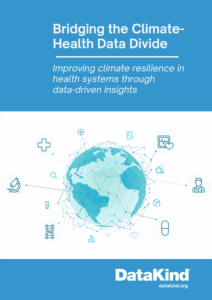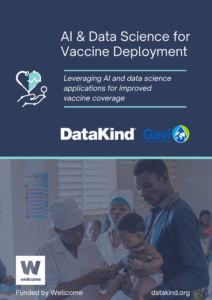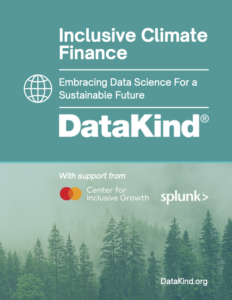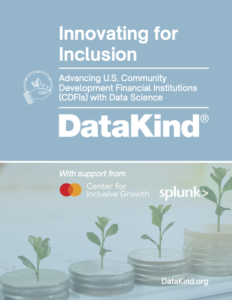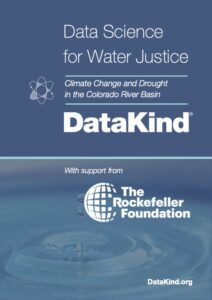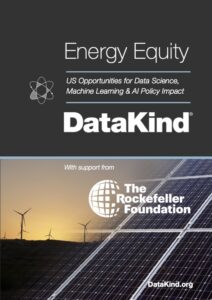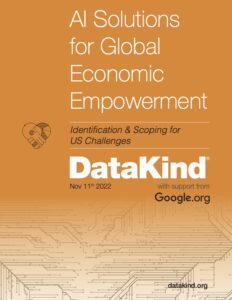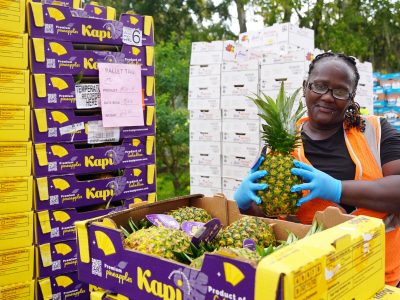
Landscaping the Future
Data science and AI are unlocking powerful new pathways to address society’s most urgent challenges – but only when they’re translated into tools that scale. At DataKind, we’re evolving beyond one-off projects to build broadly accessible, high-impact products and solutions that drive lasting change. Through deep-dive “landscape analyses,” we surface systemic patterns, data gaps, and opportunity spaces – then use those insights to design tools, guide strategic investments, and catalyze scalable solutions across sectors.
Climate change is reshaping health risks, yet many health systems lack the localized, interoperable, and actionable data needed to respond. As part of DataKind’s work building high-impact data solutions for communities, this global landscape examines what it takes to strengthen climate-resilient health systems – starting with the data that drives real-world decision-making. Drawing on expert interviews across four continents and innovations emerging in Kenya, Malawi, Nigeria, Mozambique, and India, the report identifies the barriers that limit climate-health data use and highlights practical, locally grounded approaches already making a difference.
AI & Data Science for Vaccine Deployment
DataKind and Gavi, the Vaccine Alliance (Gavi) have developed a landscape of how AI and data science can be leveraged to enhance vaccine coverage and address access disparities, which persist despite global advancements in vaccine technology and distribution. The outcome of an almost year-long partnership with Gavi, and funded by Wellcome, the report provides a comprehensive look into the present digital landscape and identifies impactful solutions, key gaps, and priorities for investment. The report’s findings offer a roadmap for leveraging digital innovation across various stages of the vaccine deployment life cycle to support achieving universal health coverage and vaccination coverage targets.
Inclusive Climate Finance: Embracing Data Science for a Sustainable Future
Climate change is an existential threat to our planet, and addressing it requires innovative solutions that are not only effective but also socially equitable. Inclusive climate finance (ICF) is a new approach to generating insights, identifying new opportunities, and, ultimately, combating climate change via financial solutions. DataKind’s new paper, Inclusive Climate Finance: Embracing Data Science for a Sustainable Future, digs into ICF at the intersection of climate finance and financial inclusion, identifying data gaps and offering data-driven solutions to tackle climate change.
Innovating for Inclusion: Advancing US Community Development Financial Institutions (CDFIs) with Data Science
This landscape reviews the history and role of CDFIs in financial inclusion, key challenges the industry faces, stakeholders that work in this space, and data science opportunities to leverage. This review finds three core issues affecting the ability of CDFIs to grow as businesses and as agents of financial inclusion: (1) their target markets constrain them, (2) their resource-intensive approach and small size compared to traditional institutions reduces the capacity for scaling, and (3) they lack competitive use of technology and data to aid in business operations and performance measurement.
Data Science for Water Justice: Climate Change and Drought in the Colorado River Basin
Climate change threatens the hydrological cycle the world over, increasing the likelihood of extreme events and dramatically altered ecosystems. The impacts of these events are most felt by those least able to adapt or move away from them. DataKind’s paper uses a global framework to identify key data science engagement points, and illustrates these points in the case of the Colorado River Basin (CRB), a social-ecological system that provides a case study emblematic of many climate change accelerated water justice challenges.
Energy Equity: US Opportunities for Data Science, Machine Learning, and AI Policy Impact
Energy Equity includes a variety of dimensions including reducing energy insecurity in low-income households as well as improving the delivery of benefits to (and participation in policymaking of) disadvantaged communities. Globally, energy access is driven by infrastructure, or lack thereof, but in the US, energy equity issues in the are driven by household income, with few options for most households to use less expensive and more sustainable energy sources. On average, households in the lowest quintile income bracket spend nearly a third of their income on energy (including gasoline). In comparison, the top quintile of households spends less than 5% of their income on energy. This landscape analysis, Energy Equity, digs into equity issues in US energy access, with options for data science to improve research provide better data to regulators.
AI Solutions for Global Economic Empowerment: Identification & Scoping for US Challenges
Economic empowerment is the goal of improving quality of life through increasing access to economic opportunities, while providing the resources necessary to take advantage of those opportunities. Artificial Intelligence (AI) can provide new opportunities for data driven decision making, and a framework for solutions that support mobility from poverty to stability. AI Solutions for Global Economic Empowerment focuses on how the social impact sector can build data maturity, and use these tools to improve their communities’ quality of life through increasing access to economic opportunities. AI can provide new options for data driven decision making, and a framework for solutions that support economic mobility.
